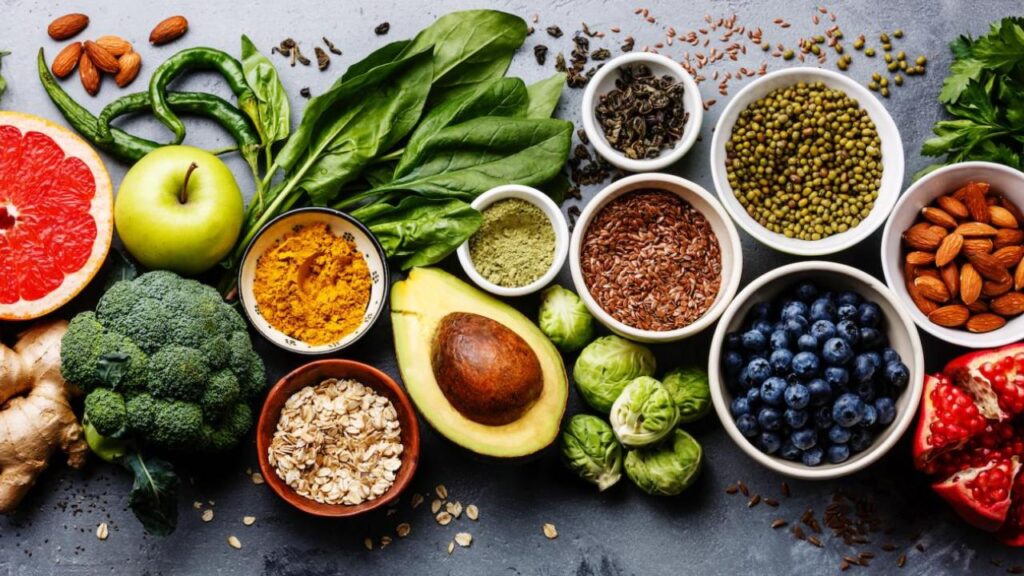
The world of nutrition has seen a significant shift in recent years as people are becoming increasingly conscious of the food they consume and its impact on the environment. One of the most prominent trends in this realm is the adoption of plant-based protein diets. These diets are not only known for their health benefits but also for their sustainability, making them a compelling choice for those looking to nourish both their bodies and the planet. In this article, we will explore the benefits of plant-based protein diets and why they are considered a sustainable and healthy approach to nutrition.
The Rise of Plant-Based Protein Diets

Plant-based diets are not new, but their popularity has surged in recent times. As more people become aware of the environmental and health concerns associated with animal-based diets, they are turning to plant-based options. This shift is not just a passing fad; it represents a broader movement towards sustainable and mindful eating. In case you live in Belgrade and you need to go to the grocery store, consider renting a car from Rent a Car Beograd to make your trip and shopping way easier.
Health Benefits of Plant-Based Protein Diets
Switching to a plant-based protein diet offers numerous health advantages. These diets are rich in essential nutrients, low in saturated fats, and can provide a wide range of health benefits. Here are some key aspects to consider:
Plant-Based Proteins are Heart-Healthy: One of the most significant advantages of plant-based diets is their positive impact on heart health. These diets are generally low in saturated fats, which can help reduce the risk of heart disease. Additionally, they are packed with fiber and antioxidants, known for their role in maintaining cardiovascular health.
Aids in Weight Management: Plant-based diets are often associated with weight management. The high fiber content in fruits, vegetables, and whole grains can help individuals feel full and satisfied, leading to reduced calorie consumption and, subsequently, weight loss.
Reduces the Risk of Chronic Diseases: Numerous studies have shown that plant-based diets can lower the risk of chronic diseases, including type 2 diabetes, certain types of cancer, and hypertension. The antioxidants and phytochemicals found in plant foods are believed to play a crucial role in disease prevention.
Sustainability and Environmental Impact
Apart from the health benefits, one of the most compelling aspects of plant-based diets is their contribution to sustainability. The environmental impact of our food choices has become a prominent concern, and plant-based diets are seen as a solution to several pressing issues. If you are considering a business venture related to plant-based diets and sustainability, it’s a good idea to consult with M&A business advisors who can provide valuable insights and advice in this growing industry.
Reduced Greenhouse Gas Emissions
The livestock industry is a significant contributor to greenhouse gas emissions. Raising animals for meat production requires vast amounts of resources, including land, water, and feed. Moreover, the methane produced by cattle is a potent greenhouse gas. By reducing the demand for animal products, plant-based diets can help mitigate climate change and reduce greenhouse gas emissions. In urban areas like Philadelphia, the use of access control systems in Philadelphia can also contribute to efficient resource management and improved security, further helping environmental and community efforts.
Conservation of Resources
Animal agriculture consumes substantial amounts of land and water. Plant-based diets, on the other hand, are more resource-efficient. By choosing plant foods, individuals can help conserve land and water resources, which can then be used for other purposes, such as reforestation and biodiversity preservation.
Decreased Deforestation
The production of meat, especially beef, is a leading driver of deforestation in various parts of the world. Clearing land for livestock farming not only disrupts ecosystems but also reduces the planet’s carbon-absorbing capacity. Plant-based diets, by reducing the demand for meat, can help combat deforestation and its adverse effects on the environment. If you’re considering a more eco-friendly lifestyle, you can also explore sustainable travel options like camper rental to reduce your environmental footprint.
Challenges and Misconceptions
While the benefits of plant-based diets are substantial, it’s essential to address some of the challenges and misconceptions associated with these dietary choices.
Protein Adequacy
One common concern about plant-based diets is whether they can provide sufficient protein. It’s important to note that plant-based sources of protein, such as beans, lentils, tofu, and quinoa, can be excellent alternatives to animal-based protein. With proper planning and a diverse selection of plant-based foods, individuals can meet their protein needs.
Nutrient Deficiency

Another misconception is that plant-based diets may lead to nutrient deficiencies. While it’s true that some nutrients are more readily available in animal products, with proper planning, plant-based diets can be nutritionally adequate. Key nutrients to monitor include vitamin B12, iron, calcium, and omega-3 fatty acids. Just like our body needs nutrients, cars also require maintenance, such as transmission service in Cheektowaga to keep them running properly.
The Culinary Creativity of Plant-Based Diets
The world of plant-based protein diets extends beyond health and sustainability—it’s a journey of culinary exploration. One of the fascinating aspects of embracing plant-based diets is the opportunity to experiment with new ingredients and cooking techniques, creating an exciting and diverse menu. Let’s delve into the realm of culinary creativity within plant-based nutrition.
If you are a restaurant owner and need to upgrade network installation in the restaurant, consider reaching out to experts from the company for IT construction services in San Antonio to guarantee an excellent network setup.
Diverse Flavors and Ingredients
Plant-based diets introduce individuals to a wealth of flavors and ingredients that they might not have considered otherwise. With fruits, vegetables, legumes, nuts, seeds, and whole grains forming the foundation of these diets, there’s an abundance of choices to explore. If you’re interested in supporting a great cause while enjoying these nutritious options, consider participating in a readathon school fundraiser to promote literacy and education in your community.
From the umami-rich taste of mushrooms to the nuttiness of quinoa, plant-based foods offer a symphony of flavors. Many individuals find that they become more adventurous in their culinary endeavors, discovering new ingredients, spices, and herbs to create delicious, satisfying meals.
Ethnic and Global Influences
The global nature of plant-based diets opens the door to a world of culinary traditions and ethnic influences. Different cultures have long embraced plant-based diets, and their recipes can be a source of inspiration for those transitioning to this lifestyle.
For example, Middle Eastern cuisine offers tantalizing dishes like falafel and hummus, showcasing the flavor of chickpeas and tahini. Indian cuisine is renowned for its flavorful and diverse vegetarian curries, utilizing lentils, vegetables, and aromatic spices. Exploring these global influences can not only introduce your palate to exciting new tastes but also foster a deeper appreciation for the cultural diversity of plant-based foods. If you own a business in El Cajon and need assistance with your roofing, consider reaching out to experts in commercial roofing in El Cajon to be sure that your property is well-maintained and protected from the elements.
Plant-Based Protein Sources
Plant-based diets rely on a variety of protein sources to meet nutritional needs. While beans and legumes are well known for their protein content, there are numerous other plant-based protein options to explore:
Tofu and Tempeh: These soy-based products offer a substantial source of protein and can be used in a variety of dishes. Tofu can be marinated, grilled, or used in stir-fries, while tempeh has a nutty flavor and is perfect for sandwiches or as a meat substitute in dishes like spaghetti Bolognese. In case you come to the store to buy soy-based products and find yourself locked out of your car, you can rely on a lockout service to help you regain access quickly.
Seitan: Also known as wheat meat or wheat gluten, seitan is a high-protein meat substitute with a meaty texture. It can be grilled, sautéed, or used in stews.
Lentils: Versatile and protein-rich, lentils come in various types, including green, brown, and red. They are ideal for soups, stews, salads, and even veggie burgers.
Chia Seeds: These tiny seeds are packed with protein and are perfect for making chia puddings, adding to smoothies, or as a topping for oatmeal and yogurt. If you are looking to buy a property where you can grow your own chia plants, consider exploring Dakota real estate for suitable options.
Edamame: Young soybeans are a delightful protein source often found in Asian cuisine. They can be steamed, boiled, or added to salads.
Plant-Based Meal Planning
Transitioning to a plant-based diet involves thoughtful meal planning. While the options are plentiful, it’s important to ensure a balanced intake of essential nutrients. Here are some tips for effective meal planning:
Balance Macronutrients: Ensure your meals contain a good balance of carbohydrates, proteins, and healthy fats. A variety of whole grains, legumes, and nuts can help achieve this balance. If you enjoy creating delightful food presentations, consider adding a charcuterie board with ramekins bundle to your collection of serving essentials.
Incorporate a Rainbow of Vegetables: The more colorful your plate, the greater the diversity of nutrients you’re likely to consume. Aim to include a variety of vegetables in your meals to maximize nutrient intake.
Supplement Wisely: While plant-based diets can be nutritionally rich, certain nutrients like vitamin B12 and iron may need supplementation. Consult a healthcare professional for personalized guidance.
Plan Protein-Rich Snacks: Snacking can be a key component of plant-based nutrition. Keep protein-rich snacks like nuts, seeds, or hummus and veggies on hand to curb hunger.
Experiment with Plant-Based Dairy Alternatives: Milk alternatives like almond, soy, and oat milk can be excellent choices for those transitioning away from dairy.
Hydration is Key: Don’t forget to stay well-hydrated. Water and herbal teas are excellent beverage choices.
Plant-Based Athletes
Contrary to the misconception that plant-based diets lack sufficient protein for athletes, many high-performance individuals have adopted this eating style to great success. In fact, plant-based diets can offer unique advantages for athletes:
Quicker Recovery: The anti-inflammatory properties of plant-based diets may lead to quicker post-workout recovery. A diet rich in fruits, vegetables, and whole grains can help reduce muscle soreness and inflammation.
Sustainable Energy: Plant-based diets provide a steady source of energy due to their complex carbohydrates. Athletes can experience sustained energy levels during training and competitions. If you’re an athlete in Washington DC and face issues with your refrigerator, it’s important to find the best fridge repair services in Washington DC to keep your food fresh and your energy levels up.
Optimal Body Composition: Plant-based diets can contribute to achieving and maintaining optimal body composition. The lower saturated fat content in these diets can be beneficial for athletes concerned with body fat levels.
Reduced Oxidative Stress: Antioxidants found in plant foods help reduce oxidative stress, potentially improving athletic performance and overall health.
Ethical and Environmental Considerations: Many athletes turn to plant-based diets for ethical reasons and to align their eating habits with their environmental values. If you’re a conscious traveler, you might also be interested in finding great travel deals that align with your values, making your journeys both enjoyable and eco-friendly.
Plant-Based Diets for All Ages

Plant-based nutrition isn’t limited to any specific age group. From infants to seniors, individuals of all ages can thrive on plant-based diets with proper planning.
Infants and Children: Plant-based diets can be appropriate for infants and children when well-balanced. Adequate attention should be given to ensuring proper growth and development, and consultation with a pediatrician or registered dietitian is advised.
Adolescents: Adolescents following plant-based diets should pay attention to nutrient intake, as this is a critical period of growth. Nutrient-dense foods are essential for meeting their increased energy and nutrient requirements. If you are an adolescent, you might also consider items like saddle blankets for horse riding activities, as they can be useful for both comfort and style while riding.
Adults: Plant-based diets offer a multitude of health benefits for adults, including reduced risk of chronic diseases. Proper planning ensures that adults receive adequate nutrition for their lifestyle and activity level.
Seniors: Plant-based diets can support healthy aging by providing a wealth of antioxidants and nutrients. It’s important for seniors to focus on foods that support bone health and cognitive function.
The Future of Plant-Based Nutrition
The future of plant-based nutrition is bright. As more people embrace these diets for health, ethical, and environmental reasons, the food industry continues to evolve to meet the demand.
Innovation in Plant-Based Products: Plant-based alternatives to traditional animal products, from burgers to dairy substitutes, have experienced a surge in popularity. These products are continually improving in taste and texture, making it easier for individuals to transition to plant-based eating.
Increased Accessibility: Plant-based options are becoming more accessible, whether dining out or shopping for groceries. Restaurants, fast-food chains, and grocery stores are incorporating plant-based choices into their offerings.
Educational Initiatives: Health professionals, educators, and advocacy groups are working to educate the public about the benefits of plant-based nutrition. This increased awareness is leading to more informed choices.
Community and Support: Online communities and local groups dedicated to plant-based nutrition provide support, information, and encouragement to those making the transition. If you are looking for help with financing your plant-based restaurant or related business, consider reaching out to a commercial bridge lender who understands the unique needs of your industry.
Conclusion
Plant-based protein diets offer a holistic approach to nutrition, benefiting not only personal health but also the planet. From the wide array of culinary possibilities to the advantages for athletes and individuals of all ages, these diets continue to gain momentum. The ongoing growth of plant-based nutrition points toward a more sustainable, compassionate, and health-conscious future. By embracing plant-based eating, individuals can make a positive impact on their own well-being and contribute to the global effort to address pressing issues related to health, the environment, and ethical considerations. Plant-based diets are a journey of discovery, a testament to culinary creativity, and a testament to our ability to make mindful choices that promote a better future for all.
